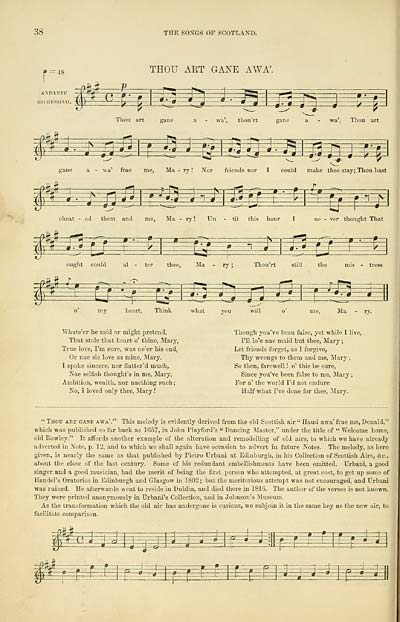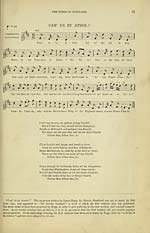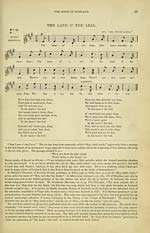Glen Collection of printed music > Printed music > Wood's edition of the songs of Scotland
(62) Page 38 - Thou art gane away
Download files
Complete book:
Individual page:
Thumbnail gallery: Grid view | List view

38
THE SONGS OF SCOTLAND.
r
: 48
THOU AET GANE AWA\
V
ANDANTE ^ (i „ —
ESl'liESSlVO. (()) ff ^ T^T
=^5 — F ^
:fc=S=
l^-f # -J ^
Thou art
gane
thou'rt
gane
IF
wa\ Thou art
*t
P^^
iLH
^
f ^ tJ — J T' -g-
SB^a ^
gane a - wa' frae me, Ma - ry ! Nor friends nor I could make thee stay; Thou hast
ajt . — . n- .....-, _ _ j
$=] lS H =t^ = ~TjH^ ]-^ jsz -ff ;7 f -^f~ l !_f ^ =^
E
s
p^
— u-
cheat - ed them and me. Ma - ry ! Un - til this hour I ne - ver thought That
W^m^m
— a r < — r g 3— ?
-f i * — *^-*— r
t=E
■»—
ta=
S==^E
**
ought could al - ter thee, Ma
I* o
ry :
Thou'rt still the mis - tress
wmmm
f— -*^* — *
^5
* •
^=
my
heart,
Think
what
Ma
Wkate'er he said or might pretend,
That stole that heart o' thine, Mary,
True love, I'm sure, was ne'er his end,
Or nae sic love as mine, Mary.
I spoke sincere, nor flatter'd much,
Nae selfish thought's in me, Mary,
Ambition, wealth, nor naething such ;
No, I loved only thee, Mary !
Though you've been false, yet while I live,
I'll lo'e nae maid but thee, Mary ;
Let friends forget, as I forgive,
Thy wrongs to them and me, Mary ;
So then, farewell ! o' this be sure,
Since you've been false to me, Mary ;
For a' the world I'd not endure
Half what I've done for thee, Mary.
" Thou aet qane awa'." This melody is evidently derived from the old Scottish air " Haud am' frae me, Donald,"
which was published so far back as 1657, in John Playford's " Dancing Master," under the title of " Welcome home,
old Rowley." It affords another example of the alteration and remodelling of old airs, to which we have already
adverted in Note, p. 12, and to which we shall again have occasion to advert in future Notes. The melody, as here
given, is nearly the same as that published by Pietro Urbani at Edinburgh, in his Collection of Scottish Airs, &c,
about the close of the last century. Some of his redundant embellishments have been omitted. Urbani, a good
singer and a good musician, had the merit of being the first person who attempted, at great cost, to get up some of
Handel's Oratorios in Edinburgh and Glasgow in 1802; but the meritorious attempt was not encouraged, and Urbani
was ruined. He afterwards went to reside in Dublin, and died there in 1816. The author of the verses is not known.
They were printed anonymously in Urbani's Collection, and in Johnson's Museum.
As the transformation which the old air has undergone is curious, we subjoin it in the same key as the new air, to
facilitate comparison.
#
ffegj
-•— *-
_g 1-
THE SONGS OF SCOTLAND.
r
: 48
THOU AET GANE AWA\
V
ANDANTE ^ (i „ —
ESl'liESSlVO. (()) ff ^ T^T
=^5 — F ^
:fc=S=
l^-f # -J ^
Thou art
gane
thou'rt
gane
IF
wa\ Thou art
*t
P^^
iLH
^
f ^ tJ — J T' -g-
SB^a ^
gane a - wa' frae me, Ma - ry ! Nor friends nor I could make thee stay; Thou hast
ajt . — . n- .....-, _ _ j
$=] lS H =t^ = ~TjH^ ]-^ jsz -ff ;7 f -^f~ l !_f ^ =^
E
s
p^
— u-
cheat - ed them and me. Ma - ry ! Un - til this hour I ne - ver thought That
W^m^m
— a r < — r g 3— ?
-f i * — *^-*— r
t=E
■»—
ta=
S==^E
**
ought could al - ter thee, Ma
I* o
ry :
Thou'rt still the mis - tress
wmmm
f— -*^* — *
^5
* •
^=
my
heart,
Think
what
Ma
Wkate'er he said or might pretend,
That stole that heart o' thine, Mary,
True love, I'm sure, was ne'er his end,
Or nae sic love as mine, Mary.
I spoke sincere, nor flatter'd much,
Nae selfish thought's in me, Mary,
Ambition, wealth, nor naething such ;
No, I loved only thee, Mary !
Though you've been false, yet while I live,
I'll lo'e nae maid but thee, Mary ;
Let friends forget, as I forgive,
Thy wrongs to them and me, Mary ;
So then, farewell ! o' this be sure,
Since you've been false to me, Mary ;
For a' the world I'd not endure
Half what I've done for thee, Mary.
" Thou aet qane awa'." This melody is evidently derived from the old Scottish air " Haud am' frae me, Donald,"
which was published so far back as 1657, in John Playford's " Dancing Master," under the title of " Welcome home,
old Rowley." It affords another example of the alteration and remodelling of old airs, to which we have already
adverted in Note, p. 12, and to which we shall again have occasion to advert in future Notes. The melody, as here
given, is nearly the same as that published by Pietro Urbani at Edinburgh, in his Collection of Scottish Airs, &c,
about the close of the last century. Some of his redundant embellishments have been omitted. Urbani, a good
singer and a good musician, had the merit of being the first person who attempted, at great cost, to get up some of
Handel's Oratorios in Edinburgh and Glasgow in 1802; but the meritorious attempt was not encouraged, and Urbani
was ruined. He afterwards went to reside in Dublin, and died there in 1816. The author of the verses is not known.
They were printed anonymously in Urbani's Collection, and in Johnson's Museum.
As the transformation which the old air has undergone is curious, we subjoin it in the same key as the new air, to
facilitate comparison.
#
ffegj
-•— *-
_g 1-
Set display mode to: Large image | Transcription
Images and transcriptions on this page, including medium image downloads, may be used under the Creative Commons Attribution 4.0 International Licence unless otherwise stated. ![]()
| Special collections of printed music > Glen Collection of printed music > Printed music > Wood's edition of the songs of Scotland > (62) Page 38 - Thou art gane away |
|---|
| Permanent URL | https://digital.nls.uk/91338487 |
|---|
| Description | Scottish songs and music of the 18th and early 19th centuries, including music for the Highland bagpipe. These are selected items from the collection of John Glen (1833 to 1904). Also includes a few manuscripts, some treatises, and other books on the subject. |
|---|
| Description | The Glen Collection and the Inglis Collection represent mainly 18th and 19th century Scottish music, including Scottish songs. The collections of Berlioz and Verdi collected by bibliographer Cecil Hopkinson contain contemporary and later editions of the works of the two composers Berlioz and Verdi. |
|---|

